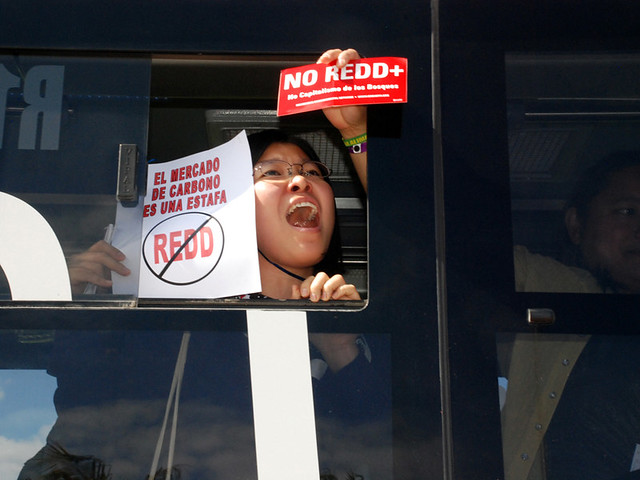Over August 9-12, fifty participants and trainers gathered in Vermont’s Northeast Kingdom for a Climate Justice Direct Action Training Camp. The camp, organized by Red Clover Climate Justice and co-sponsored by Global Justice Ecology Project provided essential direct action skills including formation of affinity groups, blockading tactics, legal rights as a protester, a history of non-violent civil disobedience, strategic planning for direct action, and the nuts and bolts of media work to ensure actions and their messages are seen as widely as possible.
Climate justice involves taking real and just action to address the root causes of the climate crisis, and transforming the system that is driving it. Direct action has a rich history of achieving the unthinkable, of changing “the impossible.” It is defined as action to directly shut down the point of production. In the case of climate change, it would be action to shut down the point of destruction. With the climate crisis worsening exponentially with every passing day, shutting down the point of destruction is critical.
It was with this in mind that the direct action training camp was organized. Coincidentally, it came just two weeks after the 36th Conference of New England Governors and Eastern Canadian Premiers in Burlington, Vermont. A major focus of that conference was energy. Vermont, which has an image of pristine greenness, relies on dangerous and dirty energy sources. This includes its aging Vermont Yankee nuclear power plant; hydroelectricity from massive dams on Indigenous Peoples’ lands in northern Quebec; and large-scale biomass electricity, which dumps more pollution into the air than coal.
Although these various mega-projects do not rely on fossil fuels as the main source of their energy, they are still “false solutions.” They cause vast ecological and social destruction and can worsen the climate crisis. Their primary function, in fact, has nothing to do with the climate. It is to maintain business as usual. While the climate crisis demands a radical re-think of how we live on and with the Earth, a fundamental changing of the system, “false solutions” are specifically designed to prevent real change. They enable the Global Elite–“the 1%” –to maintain their power and profits in the face of mounting social and ecological crises.

Activists disrupt the Northeast Governors' Conference cruise in protest of Hydro-Quebec. Photo: Will Bennington
Hydro-Quebec plans to build a series of new mega-dams on First Nations land in northern Quebec. They will drown forests, pollute fresh water, and displace villages and release huge amounts of methane--a greenhouse gas 35 times more potent than CO2.
In response, a delegation of Innu people came to the Governors’ Conference to raise awareness about and protest these new mega-dams. When the Innu delegation tried to enter the Governors’ Conference to speak with the decision-makers, however, they were refused entry.
The Governors’ Conference was emblematic of the unjust system that must be changed if we are to successfully address the climate crisis. A group of privileged white males sat down to make decisions that would irrevocably impact the lives of First Nations peoples in Canada, as well as rural communities throughout the region.
When protesters took action against this unjust conference, police responded with violence. After a march turned into the spontaneous blockade of a bus that was to take conference participants to dinner, Burlington police in riot gear shot protesters at point-blank range with “pepper balls,” a type of less lethal projectile coated with pepper spray.
The incident led to a tripling of the number of participants in the Northeast Climate Justice Direct Action Training Camp. Repression leads to resistance.
International Action for Climate Justice

Youth delegates are ejected from the Cancun climate talks for unpermitted protest. Photo: Langelle/GJEP
Within the sanctimonious halls of the United Nations Climate Conference, the promotion of false solutions, the embracing of industry and the crackdown on meaningful participation by “civil society groups” has also led to increased protest.

Youth action in Cancun. Photo: Langelle/GJEP
Through initiatives such as REDD (Reducing Emissions from Deforestation and Forest Degradation) and SEFA (Sustainable Energy for All), the UN is advancing new mega-hydro projects, the privatization of forests and other lands, and industrial-scale GMO biofuel plantations. Now, through the “Green Economy,” unveiled by the UN at its Earth Summit in Rio de Janeiro in June, the UN is promoting the privatization of every last unspoiled ecosystem for use in the perpetuation of a greenwashed version of Capitalism.
Increased protest at the annual UN Climate Conferences since 2007 has led to a major crackdown on dissent. By the end of the 2009 Climate Conference in Copenhagen, Denmark, the UN had banned nearly all civil society participants from the UN grounds due to unpermitted protests.

African Delegation protest in Copenhagen. Photo: Langelle/GJEP
In Cancun in 2010, protests happened daily. The final day saw an occupation of the Moon Palace--where the main plenary was meeting. UN security used pain compliance holds to eject and de-badge participants.

Global Day of Action March in Durban, South Africa. Photo: Petermann/GJEP
In Durban, South Africa in 2009, UN security arrested and ejected anyone that did not conform to their strict codes of conduct. While photographing the ejection of a participant, a photojournalist was assaulted by a UN security officer who shoved his camera into his face. Later, youth led a mass-occupation of the climate conference. A sit-in was initiated when security tried to make the occupation disperse.

Keith Brunner, of Global Justice Ecology Project and Red Clover Climate Justice is hauled away by UN security during the sit-in outside of the plenary at the UN Climate Convention in Durban, South Africa. Photo: Ben Powless/ IEN
The next UN climate conference takes place in Doha, Qatar. The UN is taking the lead of the WTO, which ran away to a desert fortress in Doha following the massive shut down of their meeting in Seattle in 1999.
In reality, though, these UN conferences are becoming irrelevant. During the UN’s Rio+20 Earth Summit, the real networking and decision-making happened in hotels across the city where corporate entities such as the Consumer Goods Forum hosted events to discuss implementation of controversial greenwashed eco-profiteering schemes without regard to the negotiations happening inside the UN.
Direct Action Gets the Goods
Which brings us back where we started. Direct action.
Activists based in the US have a special responsibility. We live in the belly of the beast--where overconsumption is king and where the Supreme Court has given corporations the legal right to purchase the best politician their money can buy.
We can no longer afford to waste our precious resources on lobbying politicians. Instead, it is time to take the struggle back to the elite who hold their puppet strings. Back to the corporate Boards that are quite happily making the decisions that will condemn us all to an unimaginable future.
As the radical union, the IWW said, “Direct action gets the goods.”
 Anne Petermann is the Executive Director of Global Justice Ecology Project. She is also the Coordinator of the STOP GE Trees Campaign; the North American Focal Point for the Global Forest Coalition; and a member of the Board of Directors of the Will Miller Social Justice Lecture Series.
Anne Petermann is the Executive Director of Global Justice Ecology Project. She is also the Coordinator of the STOP GE Trees Campaign; the North American Focal Point for the Global Forest Coalition; and a member of the Board of Directors of the Will Miller Social Justice Lecture Series.
 Orin Langelle, Global Justice Ecology Project Board Chair also contributed to this blog post.
Orin Langelle, Global Justice Ecology Project Board Chair also contributed to this blog post.


